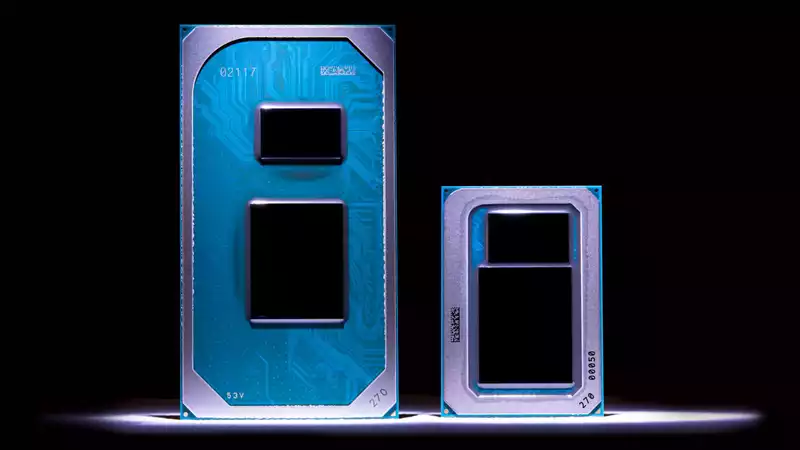Intel has unveiled an entirely new segment of gaming notebooks powered by specially designed, high-performance 10nm Tiger Lake processors. According to Intel's recent CES 2021 event, the new ultra-portable gaming notebooks are specifically designed to provide "superior mobility for enthusiast-level game play."
The specs Intel is touting are that the machine is less than 18 mm thick and can achieve over 70 fps at 1080p with the game settings set to High. In current PC gaming parlance, a "High" setting is about one step down from the top graphics preset for most titles.
To make this kind of performance possible, this new breed of gaming laptops is powered by the proprietary Tiger Lake H35 series 10nm CPUs. These are essentially the same quad-core Tiger Lake chips, but they run at 35W versus the current Ultrabook series' maximum of 28W. This will improve single-threaded performance by 4-5% over the current 28W Tiger Lake chips, and multi-threaded performance by about 10%.
There are three new chips in the Tiger Lake H35 series, all of which are probably ready for inclusion in new ultra-portable gaming laptops from now, with over 40 designs planned for the first half of this year. [The Core i7 comes in plain 11370H and special edition 11375H, with single-core maxes of 5 GHz for the SE and 4.8 GHz for the standard chip. There is also an Intel Core i5 11300H with a lower maximum frequency and less L3 cache, but all three are 4-core, 8-thread chips.
Interestingly, all of these can be configured to 28W, with correspondingly lower frequencies. In other words, they should be able to be retrofitted to current Tiger Lake laptops using 28W SKUs, with the obvious advantage that even in a reduced 28W configuration, the new H35 chips can achieve higher clock speeds than the previous chips. [For example, the Core i7 1165G7's 28W base clock is 2.8GHz, while the Core i7 11370H's 28W base clock is 3GHz.
The new mildly higher-spec Tiger Lake CPUs should pair well with Nvidia's soon-to-be-announced RTX 30 series laptop GPUs, which consume less power.
Intel has stated that it is "working closely with Nvidia and the ecosystem to leverage standard PCIe protocols to deliver higher performance." In case you forgot, Resizable BAR is a protocol that AMD has brought to the forefront with its Smart Access Memory feature, which allows the CPU to freely access the GPU's memory pool.
Nvidia is expected to announce support for Resizable BAR at its CES presentation tomorrow, and Intel has also promised support for some 10th generation chips. This is convenient given that many of this year's new laptops are still powered by 10th generation Intel CPUs. Realistically, it won't make a huge difference in terms of performance, but any little thing helps, especially within the tight constraints of ultra-portable gaming laptops.
This is to allow Intel to talk about their 11th generation gaming laptops and claim that they announced their 11th generation Tiger Lake-H series earlier this year, and with AMD about to announce a slew of new Ryzen-powered laptop APUs tomorrow, this This is extremely important from a marketing standpoint. Sure, Intel still dominates gaming laptops, but most of the new machines we will see at CES 2021 will be powered by the new Nvidia RTX 30 series GPUs and the previous generation H-series of Comet Lake processors.
The reason for this is that high-end 10nm gaming laptop chips won't appear for a while yet, perhaps until spring or summer. '
These will eventually be full-sized 8-core, 16-thread notebook chips with clock speeds above 5 GHz and "desktop-like performance" Intel had to backport its 10nm architecture to 14nm for Rocket Lake. The delay is likely the reason why they had to do this. Otherwise, it would have taken Intel a very long time to regain the top spot in gaming CPUs from AMD.
If the 10nm manufacturing process could have been run to a level that would have allowed the release of high core count mobile CPUs above 5GHz earlier this year, surely there would have been no need to backport and the same Tiger Lake cores would have been introduced into the desktop. [As a result, Tiger Lake-H will be released before the end of the year, the milder 35W update today, and Rocket Lake later.
.

Comments